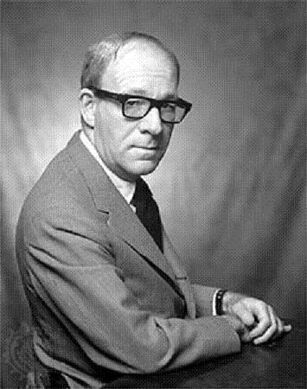Template:Refimprove

Howard Moss (1922-1987). Courtesy Wikipedia.
Howard Moss (January 22, 1922 - September 16, 1987) was an American poet, dramatist and literary critic.
Life[]
Moss was born in New York City. He attended the University of Michigan, where he won a Hopwood Award.
He was poetry editor of The New Yorker magazine from 1948 until his death. He is credited with discovering a number of major American poets, including Anne Sexton and Amy Clampitt.
He was a closeted homosexual.[1]
Writing[]
David Ray, Contemporary Poets: "Partly as a consequence of [his role at the New Yorker] his own talent has been underrated. "Yet he has with consistent productivity ... turned out volume after volume and has dutifully and with impressive scholarship written criticism. He is, in short, an American man-of-letters in a sense largely missing from our literary culture." [2]
Recognition[]
Moss won the National Book Award in 1972 for his Selected Poems.[3]
In popular culture[]
W.H. Auden and Chester Kallman co-wrote a famously concise clerihew in his honor:
- TO THE POETRY EDITOR OF THE NEW YORKER
Is Robert Lowell
Better than Noël
Coward,
Howard?
Publications[]
Poetry[]
- The Wound and the Weather. Reynal, 1943.
- The Toy Fair. New York: Scribner, 1954.
- A Swimmer in the Air. New York: Scribner, 1957.
- A Winter Come, a Summer Gone: Poems, 1946-1960. New York: Scribner, 1960.
- Finding Them Lost and other poems. New York: Scribner, 1965.
- Second Nature. New York: Atheneum, 1968.
- Selected Poems. New York: Atheneum, 1971.
- Chekhov. Albondocani Press, 1972.
- Travel: A Window. Albondocani Press, 1973.
- Buried City. New York: Atheneum, 1975.
- A Swim Off the Rocks: Light verse. New York: Atheneum, 1976.
- Tigers and Other Lilies (juvenile poems). New York: Atheneum, 1977.
- Notes from the Castle. New York: Atheneum, 1979.
- Rules of Sleep. New York: Atheneum, 1984.
- New Selected Poems. New York: Atheneum, 1985.
Plays[]
- Two Plays: The Palace at 4 A.M. [and] The Folding Green. New York: Sheep Meadow Press, 1980.
Fiction[]
- Instant Lives. New York: Saturday Review Press, 1974
- revised as Instant Lives and More. New York: Ecco Press, 1985.
Criticism[]
- The Magic Lantern of Marcel Proust. New York: Macmillan, 1962.
- Writing against Time: Critical Essays and Reviews. Morrow, 1969.
- Whatever Is Moving. Boston: Little, Brown, 1981.
- Minor Monuments: Selected Essays. New York: Ecco Press, 1986.
Translated[]
- Paul Valery, The Cemetery by the Sea. Auralia Press, 1985.
Edited[]
- Keats. New York: Dell, 1959.
- The Nonsense Books of Edward Lear. New York: New American Library, 1964.
- The Poet's Story. New York: Macmillan, 1973.
- New York: Poems. New York: Avon, 1980.
Other[]
- (Contributor) A Casebook on Dylan Thomas. Crowell, 1960.
Except where noted, bibliographical information courtesy the Poetry Foundation.[2]
Plays[]
- The Folding Green (produced by the Poets Theatre, Cambridge, MA, 1954).
- Garden Music (produced by Theatre Saint Paul, Saint Paul, MN, 1966).
- The Oedipus Mah-Jong Scandal (produced by the Cooperative Theatre Club, New York City, 1968).
- The Palace at 4 A.M. (produced by the John Drew Theatre, East Hampton, NY, 1972).

Three Poems by Howard Moss
Except where noted, information courtesy the Poetry Foundation.[2]
See also[]
References[]
- ↑ Kat Long, "Edmund White's New York", The Gay & Lesbian Review Worldwide, Jan-Feb 2010, p. 21.
- ↑ 2.0 2.1 2.2 Howard Moss 1922-1987, Poetry Foundation, Web, Nov. 14, 2012.
- ↑
"National Book Awards – 1972". National Book Foundation. Retrieved 2012-04-07.
(With acceptance speech by Moss and essay by Scott Challener from the Awards 60-year anniversary blog.)
External links[]
- Poems
- Books
- Howard Moss at Amazon.com
- About
- Howard Moss at NNDB
| This page uses Creative Commons Licensed content from Wikipedia. (view article). (view authors). |
|